Aging

A WILL IS an important document that protects your family and ensures financial security for children who have yet to pay back the 300 grand you spent on each of them growing up. You definitely should not wait until you’re 73 to write one. In my case, I was waiting for the wisdom that comes with age. Failing that, I was also waiting for the lawyer we chose to grow up and go to law school. Because, when we first met him, I thought he was a teenager.
It’s like when I go to the doctor these days and she looks like she’s just been dropped off at soccer practice by her mom. Nothing like the white-haired doctor who used to frighten me with dire predictions of the health problems that every aging man confronts. But now that all those predictions have come true for me, I need to make my will.

IT IS A TRUTH universally acknowledged that a woman turning 30 must be in fear of her age. When I was 27, I got an accelerated peek into the process—I was in a bad car accident, and the recovery left me temporarily reliant on the trappings of old age: breathing apparatuses, a mostly liquid diet, walking with a cane.
I managed to weather it with good humor, knowing most of the changes were temporary (who hasn’t dreamt of shaking her cane from a porch at noisy youths below?). Now, back in my “correct” age, I’m grateful for that behind-the-scenes trial run at the other end of things. To be young and healthy again is a relief. But I’m now not afraid of aging, either.
I turn 30 this month. To be, at 30, unmarried, childless, career still evolving, and happy about it, as I am, is still viewed with suspicion, especially for women. While we’ve mostly divorced specific ages from expected signifiers of “adulthood”—marriage, children, home ownership, defined career—there’s still an underlying social expectation for women and men alike: Your 30s are when you “settle down.”
But my brief sojourn into old age didn’t give me a craving for these trappings of thirtydom. Instead, this visit to the end of the line gave me a deep look into my own soul. I did not emerge from enforced solitude in my later 20s looking to lock down a career and a man. I did emerge eager to honor my soul’s boundaries, newly curious about the divine, insistently pulled toward creating spaces of peace and healing for others.
Now that the chronological experience of life has been scrambled and the expected scripts tossed out, crossing over into 30 feels like the beginning of some real fun.

It's my experience, observationally and personally, that people of faith go through the same kind of U curve, the same ennui that you experience psychologically. …. this malaise, this sense that you're praying and no one's listening, that the honeymoon is over. Those really rich feelings during prayer or everyday life — that God is here and present in this moment, “I feel the palpable presence of the Holy Spirit” — for most people, I think that ebbs. I think that's part of the plan.
… I talked to a group of nuns who are in their 50s, 60s, 70s, and 80s, because I figured they had a dog in this fight — if they lost their faith it actually would matter. What do you do when stuff gets boring or dull or hard? To a nun, their answer was the same — sometimes you don't feel God, and you just keep going. It's a relationship.
A woman explores the recent trend of “death cafés” — public meetups among strangers to share experiences, memories, and challenges dealing with death of loved ones. “Death: What happens next?”
2. Has ‘Diversity’ Lost Its Meaning?
“When the word is proudly invoked in a corporate context, it acquires a certain sheen. It can give a person or institution moral credibility… It’s almost as if cheerfully and frequently uttering the word ‘diversity’ is the equivalent of doing the work of actually making it a reality.” Scorching indictment. Necessary read.
3. Persian Gulf May Soon Become Too Hot for Humans
A new study shows that by the end of the century, the heat index may hit 165 to 170 degrees for at least six hours each day. So about hosting World Cup 2022 in Qatar…
4. ‘Granny Pods’ Keep Elderly Close, at a Safe Distance
Okay, maybe we can find a better name. But these tiny houses that sit in your backyard and come with security and medical resources are a step towards improving end of life care, and keeping our families close.
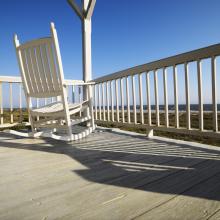
Stereotypes of aging fall into four buckets. The first, the persistent image that is considered by many to be the norm, is that aging is something to be reviled and dreaded. At best, growing old is something best done out of sight and mind, ideally in a gated community and ultimately in some kind of institutional setting.
A more palatable position, the second bucket, acknowledges aging as a time of inevitable decline and detachment, but thinks this is not a bad thing. Known as “disengagement” theory by gerontologists, proponents of this bucket think of aging as a problem to be solved in order to keep elders as serene as possible as they transit the wasteland of old age.
The third bucket, activity theory, swings the pendulum to the extreme. As a result, a new generation of elders has been put on the run. To age “successfully,” one must be kept busy pursuing second or third careers, finding renewed purpose, reinventing ourselves, and otherwise proving that one can be productive and engaged to the end. An unfortunate side effect of activity theory is the adulation of youth and the legitimization of denial. Don’t like the idea of aging? Just don’t do it.
But there’s a fourth bucket, the one we have been exploring together since that memorable conversation on the stairwell. That is, aging as a spiritual path. In this vision of aging, growing older takes on added meaning as a life stage with value and purpose of its own. The key is embracing rather than rejecting or denying the shadow side of aging.
1. Where Pope Francis Learned Humility
Francis’ road to humility was like the rest of ours: long, hard, and prideful.
2. The Meaning of Serena Williams: On Tennis and Black Excellence
“For black people, there is an unspoken script that demands the humble absorption of racist assaults, no matter the scale, because whites need to believe that it’s no big deal. But Serena refuses to keep to that script.”

IN THE U.S., mention of “aging in community” might conjure up images of weathered faces in nursing homes and snowbirds in South Florida. And yet, as increasing numbers of Americans reach the golden years—and do so in an uncertain economy—so do the array of scenarios for those growing older. Award-winning journalist Beth Baker traveled across the U.S. to document the possibilities in her latest book, With a Little Help from Our Friends: Creating Community as We Grow Older.
Some of her findings aren’t so surprising. Baby boomers have a stronger desire for independence than did their predecessors, and they aren’t keen on being tagged “elderly.” In fact, they generally see themselves in a different cohort than those born just prior to the boom.
Whether you’re in one of the aforementioned age groups or a diligent millennial thinking way ahead, Baker shows that imagining how you’ll one day balance independence with human connection in your older years doesn’t have to be daunting.
“That we can raise this question is remarkable. Never before have older people, often through their own imagination and determination, had real options from which to choose,” she writes.

Dear Church,
You are dying. I get it. Because so am I.
And, speaking as one of your pastors, I think this is a very good thing.
To be clear, I don’t have cancer. No doctor has told me to set my affairs in order. But each morning, I wake up feeling a little bit older. Each morning, I notice a few more crinkle lines around my eyes, a bit more resistance when I change what I eat or how I move. Each morning, I am reminded, whether I like it or not, of my own mortality.
I cannot escape my mortality. I will someday die. Scripture reminds us that “all flesh is like grass, and all its glory like the flower of grass. The grass withers, and the flower falls” (1 Peter 1:24). I know that I am no exception to this rule; I am limited. And I live in a culture where the trend is to try to erase these limitations, where I can blur my wrinkles, try fad diets, renew my strength with the latest energy drink.
But these things are illusions. I am dying.

Can you imagine? I am now three score plus 10! According to measurements used during biblical times, a "score" was 20 years. Three score is 60 years. So three score plus ten, makes me 70. Moses put is this way in Psalms 90: "Seventy years are given to us! Some even live to eighty. But even the best years are filled with pain and trouble; soon they disappear, and we fly away." Well, I am not quite ready to fly away!
When I was a child, a 70-year-old person was truly ancient; like, really, really old. I imagined they were almost as old as dirt, salt, or the oldest Bible character, Methuselah. In my child's mind, 70 was too old to move fast, think hard, feel deeply, laugh out loud, dance gracefully, exercise intensely, and experience joy. Mostly, 70 year olds were just waiting to die. Right? Of course, they were definitely too advanced in years to think, feel, or act sexually, even though researchers say otherwise.
What is so amazing is that I feel many times better today than I felt at 60, 50, or even 40. 70 really IS the new 50!
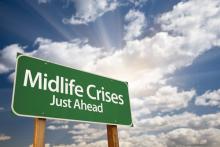
Yesterday on Facebook I referred to my daughters, who are in their early forties, as middle-aged. One of their friends, who is 43, wrote, "Middle-aged???" "For sure," I wrote back. "I know it hurts." But then I Googled middle age and discovered that its borders seem to be shifting. Once defined as ages 40 to 60, it is now often defined as ages 45 to 64 (though Merriam-Webster wants to have it both ways).
When I turned 40, everyone was talking about the midlife crisis, that scary feeling when people in the workforce fear their careers may have peaked and when caregivers at home notice their nests are practically empty (except for all that stuff in the basement). Midlife hit at age 40 back then — a bit optimistic, perhaps, considering that U.S. life expectancy in 1988 was 74.9 years. Columnist Bob Greene may have been closer to the truth when he wrote that "middle age starts at 36."
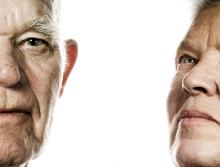
The face of aging in America isn't a pretty one. Not because the flesh is sagging, but because the nation that once built schools, malls and suburbs for baby boomer families when they were young has turned against its elderly.
Opportunistic politicians seeking to preserve tax benefits for their wealthy patrons assault Medicare as a "socialistic" entitlement serving leeches. They take aim at Social Security as undeserved, even though recipients basically receive funds they themselves contributed over many years of working.
Banks lure the elderly into credit card debt, then slap on interest rates edging toward 40 percent and then seize property. Banks and some states siphoned off funds intended to ease mortgage stress.
If you take the time to listen, you will hear one horror story after another. People who once shared typical middle-class stories about careers and children's exploits now share dread about losing what little they have left.
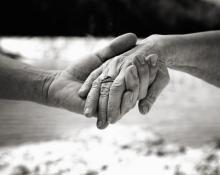
I got emails from my mom and uncle about Nana, my last living grandparent. The news isn’t great. She’s struggled with dementia for some years now and hasn’t recognized me the last several times I’ve seen her. But while her mind has been betraying her for a while, it’s her health now that seems to hang in the balance.
Not that it’s a surprise at ninety years old. And it’s also not like we’re particularly close anymore. Aside from living 700 milers away, it’s hard to have much of a relationship with someone who has no idea who you are. But there’s something about knowing she’s close to the end of her life that really freaked me out last night.
When I was a little guy, I had three great grandparents that I remember visiting. They all smelled funny and talked constantly about stuff I didn’t understand, but I got that they were family. I’d visit Pappy and Sweetie, who lived in a trailer home on the Mississippi River; Granny Hagen had her own house for a few years, and then she got moved into one of those silos where people wait to die. Yes, there are some retirement facilities that actually have signs of life in them, but this wasn’t one of them. My mom’s family was pretty poor, and things like retirement and end-of-life planning weren’t a particularly high priority.
Their deaths didn’t bother me too much. I didn’t like seeing my parents sad, but that was about it. I’d miss the candy corns and balloons Pappy always gave me (he called candy corns “duck butters” because when he’d feed them to the ducks, their butts would stick up in the air when they reached down to eat them). But my grandparents were the ones I actually knew as people.
"I'm finding out as I'm aging that I am in love with the world. And I look right now, as we speak together, out my window in my studio and I see my trees and my beautiful, beautiful maples that are hundreds of years old, they're beautiful. And you see I can see how beautiful they are. I can take time to see how beautiful they are."
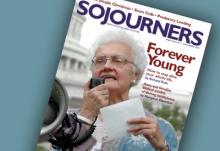
Whenever I read Luke’s account of the presentation of the infant Jesus in the temple (Luke 2:25-38), I always picture a late afternoon in winter. Nature has slowed down. The day is dying.
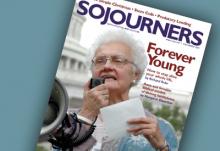
Understanding the true presence of Christ helps us become elders, not just elderly.